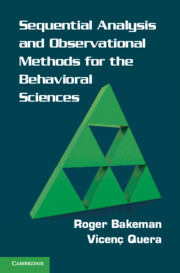Book contents
- Frontmatter
- Contents
- Figures
- Preface
- 1 Introduction to Observational Methods
- 2 Coding Schemes and Observational Measurement
- 3 Recording Observational Data
- 4 Representing Observational Data
- 5 Observer Agreement and Cohen’s Kappa
- 6 Kappas for Point-by-Point Agreement
- 7 The Intraclass Correlation Coefficient (ICC) for Summary Measures
- 8 Summary Statistics for Individual Codes
- 9 Cell and Summary Statistics for Contingency Tables
- 10 Preparing for Sequential and Other Analyses
- 11 Time-Window and Log-Linear Sequential Analysis
- 12 Recurrence Analysis and Permutation Tests
- Epilogue
- Appendix A Expected Values for Kappa Comparing Two Observers
- Appendix B Expected Values for Kappa Comparing with a Gold Standard
- References
- Index
5 - Observer Agreement and Cohen’s Kappa
Published online by Cambridge University Press: 05 June 2012
- Frontmatter
- Contents
- Figures
- Preface
- 1 Introduction to Observational Methods
- 2 Coding Schemes and Observational Measurement
- 3 Recording Observational Data
- 4 Representing Observational Data
- 5 Observer Agreement and Cohen’s Kappa
- 6 Kappas for Point-by-Point Agreement
- 7 The Intraclass Correlation Coefficient (ICC) for Summary Measures
- 8 Summary Statistics for Individual Codes
- 9 Cell and Summary Statistics for Contingency Tables
- 10 Preparing for Sequential and Other Analyses
- 11 Time-Window and Log-Linear Sequential Analysis
- 12 Recurrence Analysis and Permutation Tests
- Epilogue
- Appendix A Expected Values for Kappa Comparing Two Observers
- Appendix B Expected Values for Kappa Comparing with a Gold Standard
- References
- Index
Summary
As noted in earlier chapters, measuring instruments for observational methods consist of coding schemes in the hands (and minds and eyes) of trained observers. Like all measuring instruments, they need to be calibrated; we need to be assured that the instruments are accurate. With human observers, this means demonstrating that two observers independently coding the same stream of behavior produce essentially the same results – or, perhaps better, that an observer agrees with a gold standard, a version that has been prepared by experts and is presumed accurate. It is not an exaggeration to call such demonstrations of observer agreement the sine qua non of observational methods. Without such demonstrations, we are left with individual narratives – perhaps fascinating, perhaps insightful, perhaps useful for generating research questions – but nonetheless narratives of unknown reliability.
Nothing is absolute, and a suitable level of agreement between two independent observers does not by itself guarantee accuracy: After all, two observers could share similar deviant views of the world. But almost always in the behavioral research world, observational methods require attention to and demonstration of observer agreement – either two observers with each other or one observer with a gold standard.
- Type
- Chapter
- Information
- Publisher: Cambridge University PressPrint publication year: 2011
- 2
- Cited by



